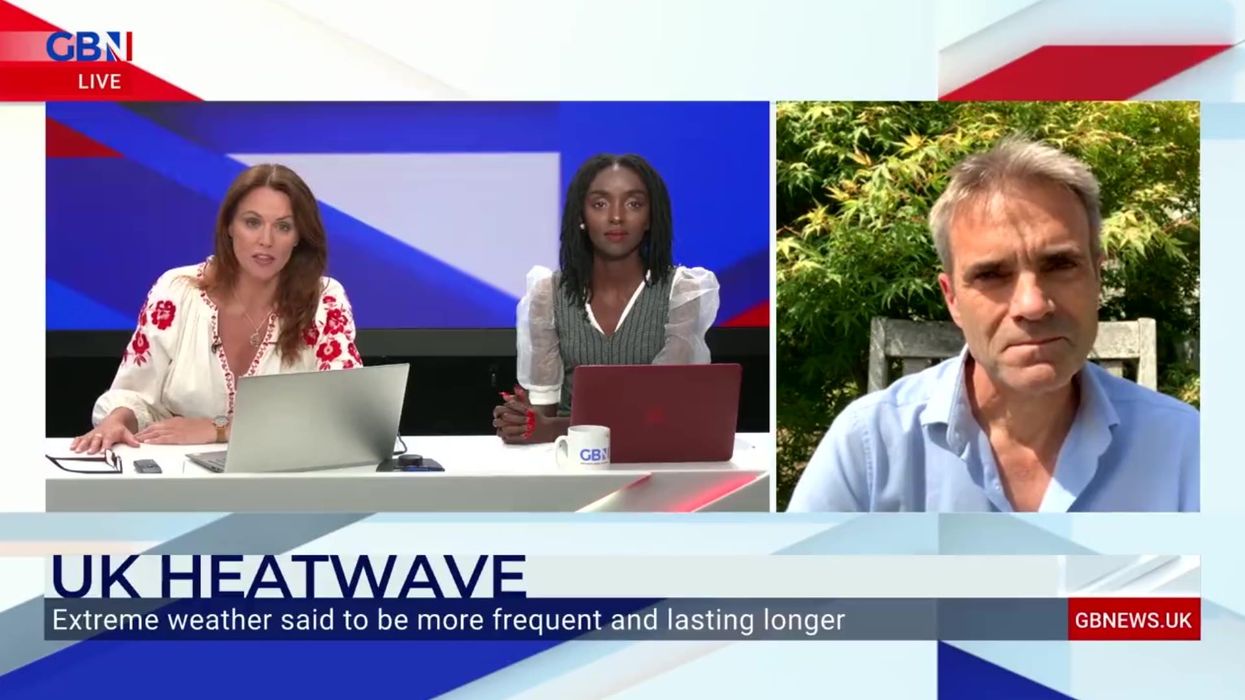GB News host tells meteorologist to be 'happy' about heatwave
GB News
We're just a week removed from the hottest heatwave the UK has ever experienced with temperatures exceeding 40c in some parts of the country leading to devastating wildfires.
Parts of Europe also saw their highest temperature records not only beaten but completely obliterated.
Not that the subject should have ever gone away but the heatwave has reignited the conversation around climate change and the toll that it is taking on the planet because let's be honest, the UK and other countries in Europe just aren't equipped for this kind of weather.
However, unless dramatic changes are made soon then the summer's in the UK will only continue to get hotter and hotter, causing even more damage.
Sign up to our new free Indy100 weekly newsletter
With this in mind, it's worth looking at what the experts say about how climate change is likely to completely change our lives if it progresses at its current rate.
1. Unliveable cities
According to a study published by the University of Maryland published last year, US cities are set to heat up quite a bit by 2080.
The city of Denver, Colorado, is predicted to become as hot and wet as Borger, Texas and Philadelphia will feel warmer and drier, like Memphis, Tennessee. New York City will be up to 5C warmer.
Chandana Mitra, an associate professor of geosciences at Auburn University, who studies the impact of heat on cities told the Guardian: "Maybe in 50 or 60 years, living in some cities will be unbearable. There could be a tipping point of no return."
2. Increase in heat-related deaths
The Centre for Disease Control and Prevention reported that from 1999 to 2010 an average of 658 people die every year from heat-related causes. The young, elderly and poorer communities are most vulnerable, and air pollution in cities exacerbates heat problems.
3. Frequent blackouts
In 2019, a simultaneous malfunction at an offshore wind farm and gas facility caused a power cut in the UK.
National Grid Electricity System Operator (NGESO) officials said the lightning strike hit a transmission circuit at 4.52pm on 9th August in a “rare” event.
Extreme weather conditions are set to increase over the years due to climate change, and this could increase the frequency of power cuts and blackouts.
In 2018, African nations faced blackouts as rising temperatures dried up their hydropower dams.
4. Infrastructure problems, like melting asphalt
Heat could impact city infrastructure, especially if officials aren’t prepared for the rising heat temperatures. Airlines in Phoenix, Arizona cancelled some 40 flights as temperatures hit 48C in 2017.
5. Increase in flooding
In 2019, the Environment Agency has warned England’s flood planners to prepare for the worst on climate change.
Emma Howard Boyd, the chairwoman, said on current trends global temperature could rise between 2C and 4C by 2100 and £1bn needs to be spent on flood management.
She said that some communities may even need to move because of the risk of floods: "[In some places] the scale of the threat may be so significant that recovery will not always be the best long term solution [and communities would need help to] move out of harm's way."
6. Increase in respiratory diseases like asthma
According to the Climate Reality Project, dirty fossil fuel emissions that contribute to the greenhouse effect can lead to respiratory diseases such as asthma in both children and adults.
Air pollution kills an estimated seven million people worldwide every year, according to the World Health Organisation.
Asthma UK lists a number of triggers for asthma sufferers, including extreme hot or cold weather and thunderstorms.
7. Less nutritious food
The Climate Reality Project warns: "The same CO2 accumulating in our atmosphere thanks to fossil fuels is actually changing the composition of fruits and vegetables that we eat, making them less nutritious.
"Extra CO2 is speeding up photosynthesis and causing plants to grow with more sugar and less calcium, protein, zinc, and important vitamins.
"According to Harvard researchers, if we don’t reduce carbon emissions right now, this could spell big problem for our diets. By the middle of the century about 175 million more people could develop a zinc deficiency and 122 million people could become protein deficient as a result of these changes to plant physiology."
A dire warning...
Have your say in our news democracy. Click the upvote icon at the top of the page to help raise this article through the indy100 rankings.
Top 100
The Conversation (0)














